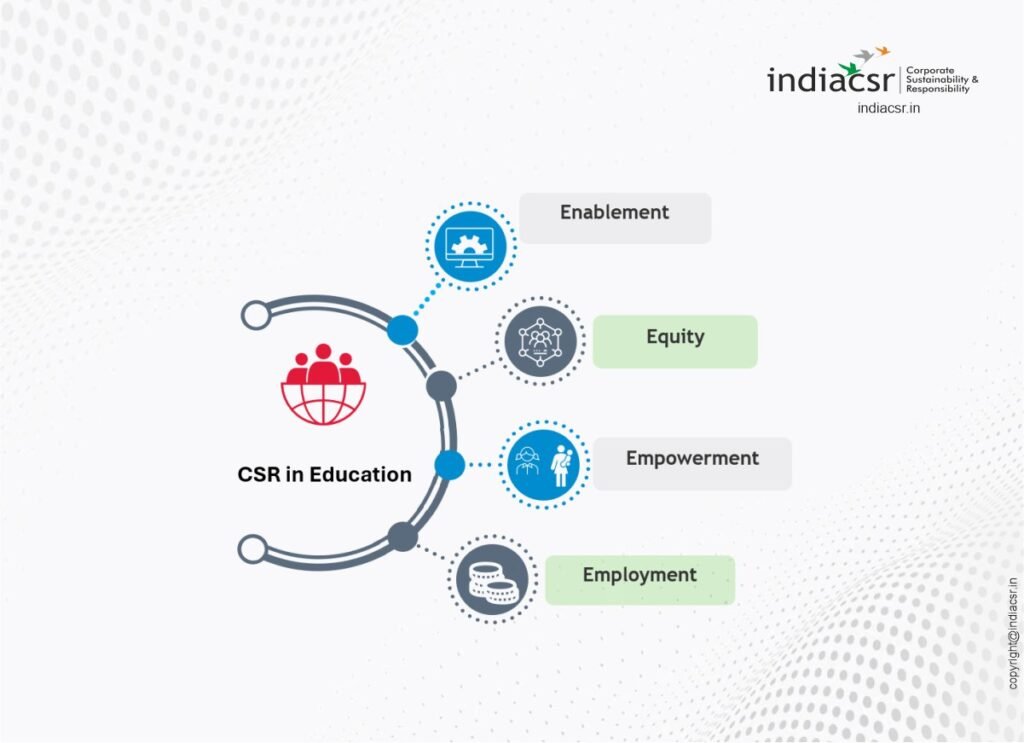The 4 Es of CSR in Education—Empowerment, Equity, Environment, and Engagement—represent a comprehensive approach towards integrating social responsibility with educational initiatives.
Words Rohin Kapoor
Table of Contents
Mandatory provision of CSR under the Companies Act 2013, applicable to a certain set of companies, came into effect on 1 April 2014. The government has notified a list of activities for companies to fulfil these obligations, including education, skill development, healthcare, and research, among others. Given the massive scope and potential to make a long-term impact on India’s future generations, education has emerged as the most preferred activity for fulfilling CSR obligations.
As per the Ministry of Corporate Affairs, the education sector received INR 29,918 crore in CSR funding between FY 2016-17 and FY 2020-21, which is by far the highest in comparison to other activities. To make a tangible and measurable impact at scale, companies must ensure that their policies and programmes consider the following 4Es before choosing a project in CSR in Education.
***
1. Enablement
Since independence, India has taken giant strides in building educational infrastructure for K12, and higher and vocational education. However, there are still millions of students residing in certain pockets of the country with limited access to basic physical learning infrastructure, teachers, resources and technology. Schools are either located far from where students reside, are in dilapidated condition or are split as primary/ secondary and senior secondary wings in different areas leading to an increase in the drop-out rates. Similar situations are seen in the case of higher and vocational education.
Therefore, enabling access for every student to quality educational institutions irrespective of their demographics and socio-economic profile should be one of the key objectives of CSR in Education programmes. With deep penetration of feature phones with stable connectivity in rural areas, companies should invest in building content to help students who have dropped out of the mainstream in obtaining secondary certification through open schooling and seek employment in call centres/ malls or as delivery associates.

***
2. EQUITY
In the context of CSR in Education, equity translates into benefits shared equally by all stakeholders, communities and society at large. In the education sector, one of the key criteria for funding a particular programme should be the coverage in terms of beneficiaries. Students from socially deprived families, especially girls, orphans, widows and senior citizens should receive optimum exposure to learning and skilling programs. Companies must ensure that there is no bias against the students in terms of age, gender and caste of the learners.
Currently, the target audience for most of the interventions in this sector seems to be skewed towards primary school children, however, it is now time to expand the horizon and maximise the benefits across the society.
***
3. EMPOWERMENT
CSR in Education tends to impart a feeling of self-belief, confidence and a power to take on the world. The empowerment of one individual has a multiplier effect on his/ her family, relatives, friends, neighbours and acquaintances. Furthermore, the positive impact spreads to healthcare, sanitation, livelihood prospects and other related fields. Particularly, girls and women belonging to some of the most backward sections of society can transform the lives of everyone around them if they are empowered. Education imparted through peer-to-peer learning, sports, plays and dramas has been extremely successful in achieving this objective.
***
4. EMPLOYMENT
To break the vicious cycle of poverty, education and employment need to be closely knitted together. It is the need of the hour to design relevant courses and curricula in consultation with the industry. This helps in opening a number of job prospects.
Companies can fund research and development in building the right curricula, pedagogy and support infrastructure to impart such vocational education programmes. A quality talent pool can be developed by companies joining hands in a particular sector/ industry. Attractive job prospects at the end of an educational programme keep the motivation high among students and ensure lower dropouts.
The CSR in education sector presents numerous opportunities for meaningful interventions. By adhering to the principles of 4 Es, companies and foundations can choose the right project/ programme that can deliver significant results and contribute to the overall development of society.
***

About the Author
Rohin Kapoor, Partner, Management Consulting, BDO India
Disclaimer – The views, thoughts and opinions expressed in the article are solely the author’s and are not representative of the author’s employer/organisation.
You may also like:
- The Future of CSR in India with Nirbhay Lumde
- M P Ahammed: Shaping a Sustainable Future Through CSR
- The Shadow of Doubt: CSR Scams, Political Parties, and the Erosion of Ethics
- Embracing Neurodiversity: Autism and Corporate Social Responsibility (CSR)
- Driving Women’s Empowerment: Transforming Lives through DriveX’s CSR Initiative







